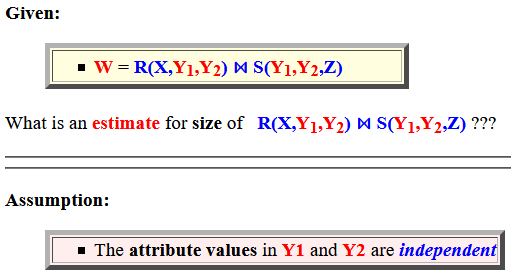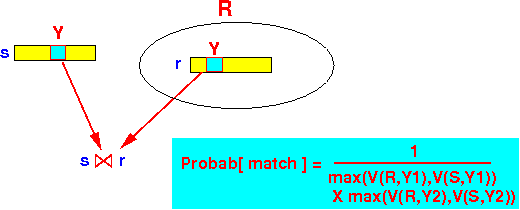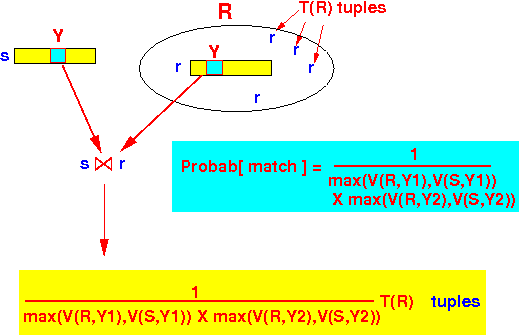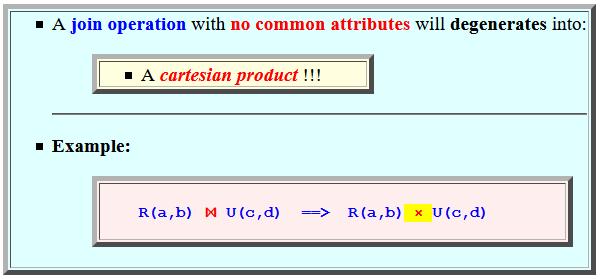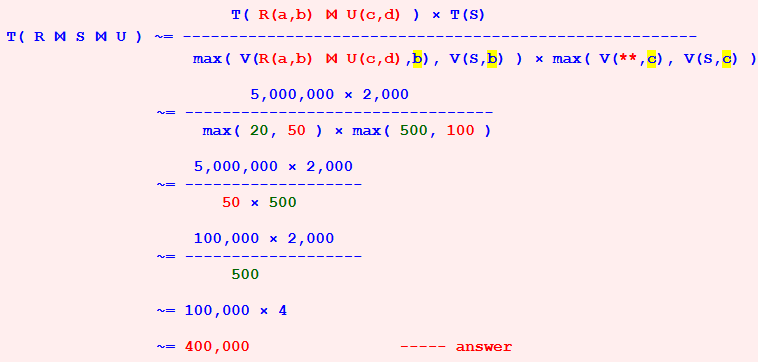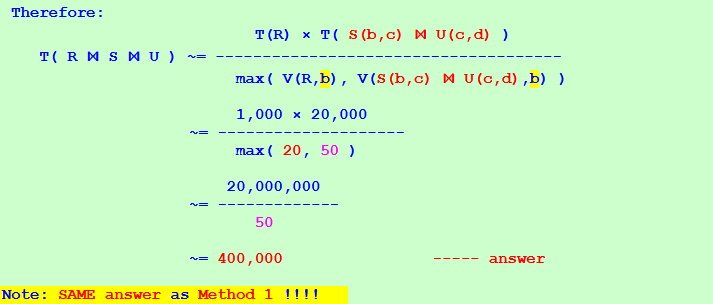Slideshow:
- Given:
- W = R(X,Y1,Y2) ⋈ S(Y1,Y2,Z)
What is an estimate for size of R(X,Y1,Y2) ⋈ S(Y1,Y2,Z) ???
- Assumption:
- The attribute values in Y1 and Y2 are independent
- Fact:
- The tuples r ∈ R and
s ∈ S will
join
and produce a tuple
in the result is when:
r(Y1) = s(Y1) and r(Y2) = s(Y2)
Previously, we have found that:
1 Probab[ r(Y1) = s(Y1) ] = ------------------------- max( V(R,Y1), V(S,Y1) ) 1 Probab[ r(Y2) = s(Y2) ] = ------------------------- max( V(R,Y2), V(S,Y2) )
- The tuples r ∈ R and
s ∈ S will
join
and produce a tuple
in the result is when:
- Assuming that the
attribute values of Y1 and
Y2 are
independent, we have:
Probab[ r(Y1) = s(Y1) and r(Y2) = s(Y2) ] 1 = --------------------------------------------------- max( V(R,Y1), V(S,Y1) ) × max( V(R,Y2), V(S,Y2) )
- Using the same reasoning, we
find that:
T( R(X,Y1,Y2) ⋈ S(Y1,Y2,Z) ) T(R) × T(S) = --------------------------------------------------- max( V(R,Y1), V(S,Y1) ) × max( V(R,Y2), V(S,Y2) )
- Information on the
input relations:
R(a,b) S(b,c) U(c,d) ======================================================= T(R) = 1000 T(S) = 2000 T(U) = 5000 V(R,b) = 20 V(S,b) = 50 V(S,c) = 100 V(U,c) = 500Problem:
- Estimate the size of R ⋈ S ⋈ U
computed using this ordering:
R(a,b) ⋈ S(b,c) ⋈ U(c,d) = ( R(a,b) ⋈ U(c,d) ) ⋈ S(b,c)
- Pre-requisite:
a join with
no common attributes
- A join operation with
no common attributes will
degenerates into:
- A cartesian product !!!
- Example:
R(a,b) ⋈ U(c,d) ==> R(a,b) × U(c,d)
- A join operation with
no common attributes will
degenerates into:
- Method 3: (ordering 3)
R(a,b) ⋈ S(b,c) ⋈ U(c,d) = ( R(a,b) ⋈ U(c,d) ) ⋈ S(b,c)
T( R(a,b) ⋈ U(c,d) ) = T (R(a,b) × U(c,d) ) // Cartesian product !! = 1000 × 5000 = 5,000,000 ............................ (1)
The estimate of the size the join ( R(a,b) ⋈ U(c,d) ) ⋈ S(b,c) is: T( R(a,b) ⋈ U(c,d) ) × T(S) ~= ------------------------------------------------------------- max( V(R(a,b) ⋈ U(c,d),b), V(S,b) ) × max( V(**,c), V(S,c) ) ^^^^^^^^^^^^^^^^^^^^ ** = R(a,b) ⋈ U(c,d)
From the preservation of value sets assumption, we have: V(R(a,b) ⋈ U(c,d),b) = V(R,b) // V(R,b) = 20 according to data = 20 ...................... (2) V(R(a,b) ⋈ U(c,d),c) = V(U,c) // V(U,c) = 500 according to data = 500 ...................... (3) Therefore: T( R(a,b) ⋈ U(c,d) ) × T(S) T( R ⋈ S ⋈ U ) ~= ------------------------------------------------------- max( V(R(a,b) ⋈ U(c,d),b), V(S,b) ) × max( V(**,c), V(S,c) ) 5,000,000 × 2,000 ~= --------------------------------- max( 20, 50 ) × max( 500, 100 ) 5,000,000 × 2,000 ~= ------------------- 50 × 500 100,000 × 2,000 ~= ------------------- 500 ~= 100,000 × 4 ~= 400,000 ----- answerNotice that:
- We got the same answer as
before:
click here
- The 2 assumptions (containment and preservation of value sets) allows you to re-order the join-order without affecting the size of the result set estimation
(The text book mentioned that this phenomenon can be proved formally but provides no proof.....)
- We got the same answer as
before:
click here
